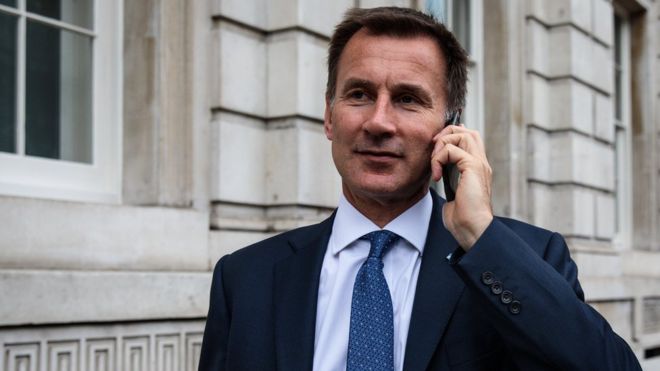
Foreign Secretary Jeremy Hunt says “extra time” may be needed to finalise legislation for Brexit.
Mr Hunt said a possible delay in the UK’s departure from the EU beyond the 29 March deadline depended on the progress made in the coming weeks.
The PM is seeking “alternative arrangements” to the backstop, but the EU says it will not renegotiate.
Parliament’s February break has been cancelled, which No 10 said showed all steps were being taken to avoid delay.
The UK is due to leave the European Union at 23:00 on 29 March. The backstop is an “insurance” policy to stop the return of checks on goods and people along the Northern Ireland border.
Earlier this month, Commons Leader Andrea Leadsom said that the EU may be prepared to grant the UK a “couple of extra weeks” beyond the 29 March deadline to finalise preparations for Brexit.
And BBC political editor Laura Kuenssberg said there had been “growing chatter” about a potential delay and a potential extension to Article 50 – the mechanism by which the UK leaves the EU.
Labour leader Jeremy Corbyn said the government “has had two-and-a-half years to negotiate and has failed to do so”.
But the prime minister’s official spokesman said the government remained committed to leaving the EU on 29 March.
“The fact that recess won’t be taking place shows you that we are taking all available steps to make sure that 29 March is our exit date,” the spokesman said.
“The prime minister’s position of this is unchanged – we will be leaving on the 29th”.
Downing Street was also discussing the possibility of Parliament sitting for extra hours in the run up to Brexit, the spokesman said.
Mr Hunt told BBC Radio 4’s Today programme: “It is true that if we ended up approving the deal in the days before the 29 March, then we might need some extra time to pass critical legislation.
“But if we are able to make progress sooner, then that might not be necessary. We can’t know at this stage exactly which of those scenarios would happen.”
Theresa May has been talking to a variety of MPs and EU leaders, including President of the European Council Donald Tusk and the Irish Taoiseach, Leo Varadkar, after MPs voted on Tuesday for her to make changes to the backstop.
Mr Hunt said it was currently a “challenging situation” and the government was “not ruling out any of these potential solutions” to the Irish border issue.
He said the commitment to the Good Friday Agreement – which protects against the return of a hard Irish border – would need to be demonstrated.
The EU’s concerns that the UK could “access the single market by the back door” would also need to be alleviated, he said.
“If we can overcome those two issues, which I think we can, then we will be able to have substantive discussions,” he said.
“But this is not going to happen in the next few days.”
The backstop was one of the main reasons Mrs May’s Brexit deal was voted down in Parliament by a record margin earlier in January because critics say a different status for Northern Ireland could threaten the existence of the UK and fear that the backstop could become permanent.
The prime minister has said there are several possible alternatives to the backstop that she wants to discuss with EU leaders.
These include:
She also wants to discuss a time limit on the backstop and a “unilateral exit” mechanism – both options ruled out by the EU in the past.
The EU’s chief negotiator, Michel Barnier said on Wednesday that the Irish backstop was “part and parcel” of the UK’s Brexit deal and would not be renegotiated.
Speaking at the European Parliament, Mr Barnier said it was a “realistic solution” to preventing a hard border.
Union officials have also been meeting with government officials in the Cabinet Office to discuss Mrs May’s Brexit plan.
Following a meeting, a Trades Union Congress spokesman said the prime minister’s deal came “nowhere close” to offering the safeguards desired for working people.
“The strongest possible protection for workers’ rights would come from sticking by single market and customs union rules,” the spokesman said.
Meanwhile, Mrs Leadsom told MPs that in this “unique session of Parliament” and “in light of the significant decisions taken by the House this week” she was giving the House notice that “there are currently no plans to bring forward a motion to agree dates for the February recess”.
Parliament had been due to rise for recess on Thursday, 14 February and return on Monday, 25 February.
Mrs Leadsom said she realised it was short notice for colleagues and House staff, but said their constituents “would expect that the House is able to continue to make progress at this important time”.
Labour leader Jeremy Corbyn accused the government of running down the clock on Brexit.
He said: “We delayed the parliamentary vote from 11 December until January – and then lost by the biggest majority ever against a government.
“Now we’re going back to Brussels but we are very unclear about what we’re going back to Brussels to do and when I asked the prime minister about this yesterday, she was incredibly vague.
“It is possible that there will have to be an extension in order to get an agreement because we cannot leave the EU on March 29 without an agreement. Crashing out would mean problems of transport, problems of medicine supply, problems of supply to the food processing industry that does just in time deliveries – and that simply is not acceptable.
“This government has had two-and-a-half years to negotiate and has failed to do so.”